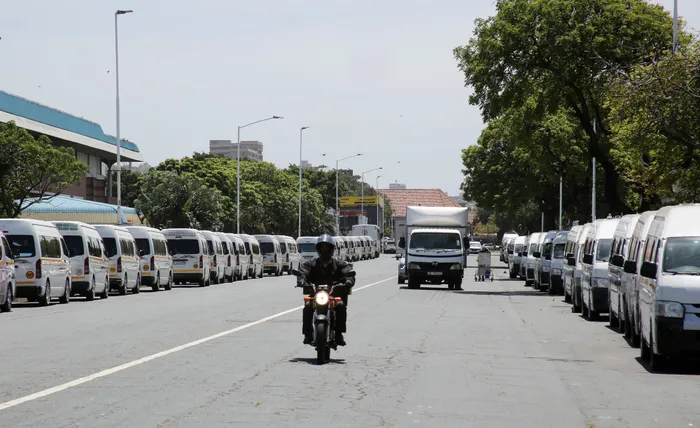
DURBAN minibus taxi networks collapsed this morning after five regions of the South African National Taxi Association withdrew their fleet citing various issues that needed to be resolved at municipal and provincial levels. The shutdown is likely to affect the long distance taxis who rely on the five regions as the feeders. The two-day shutdown has given workers, students and some learners an unscheduled long wekeend, which might affect wages and learnng.
Image: TUMI PAKKIES/Independent Newspapers
Efforts by eThekwini Mayor Cyril Xaba to avert a city-wide taxi shutdown collapsed on Thursday after five regions of the South African National Taxi Council (Santaco) pressed ahead with the two-day withdrawal of services.
Xaba, joined by City Manager Musa Mbhele, senior KwaZulu-Natal Department of Transport officials, and councillors from Clermont and KwaDabeka, the epicentre of the shutdown, held emergency talks with the eThekwini Metro Taxi Council, led by chairperson Mathula Mkhize, at the Durban City Hall last night.
The meeting started at 5pm, and by 10pm there was no solution in sight. The taxi delegation withdrew to a hotel in uMhlanga, leaving the government delegation at the City Hall to further deliberate on the matter.
KZN Transport MEC Siboniso Duma was not part of this meeting. The mayor’s failed attempt is a blow to commuters, especially workers, learners and students who rely on minibus taxis for transport.
The shutdown today also coincides with social grants payday, which compounds the shortage of transport alternatives.
By early morning today, many workers, out of fear of losing their jobs, were seen walking along major highways around Durban.
Many schools were also affected by low turnout of learners and teachers, with some informing parents and scholar transport not to risk bringing the learners to school.
The shutdown in Clermont, which started on Tuesday, has proven too expensive for commuters who sought refuge in e-hailing, as high demand increases the prices further.
On previous shutdowns buses have failed to absorb demand when taxis are off the road.
At the centre of the standoff is a long-running backlog in the issuing of operating licences, which associations say has left many drivers unable to work legally.
The municipality promised to accelerate the process and conduct an urgent economic viability survey to determine whether more permits can be issued without overloading routes and ranks.
Other flashpoints include the impounding of minibuses without permits and the mushrooming of seven-seater e-hailing vehicles operating outside the parameters of app-based services.
City officials pledged stronger law enforcement across all operators, with police urged to use discretion unless laws were openly flouted.
Xaba also promised an urgent indaba between minibus taxi operators and e-hailing services, while a joint task team of taxi leaders, municipal officials and the transport department will oversee the resolutions.
“We remain steadfast in our support for the taxi industry and are committed to implementing the resolutions of this meeting, which I will also convey to Minister of Transport Barbara Creecy,” said Xaba.
Both Xaba and the KZN Transport MEC appealed to taxi leaders to call off the strike, an appeal that came a little too late.
But speaking in an early-morning interview with road safety activist and streamer Ayanda Msweli, Mkhize made it clear the shutdown would go ahead.
“What they are asking us to do, to bring taxis without permits back on the road, is illegal,” he said, accusing the government of rushing to resolve the crisis without addressing the industry’s grievances.
Mkhize cited dilapidated taxi ranks, dysfunctional ablution blocks and a lack of shelters for commuters as long-standing concerns.
He added that taxis were sometimes impounded despite having valid permits or receipts for permits not yet issued.
Apologising to commuters, he said operators could not risk further seizures of their vehicles.
"We also apologise to businesses that would be affected," said Mkhize.
“The ball is now in the government’s court to resolve the impasse,” Mkhize said.
On e-hailing, Mkhize said the taxi industry had no objection to app-based services but warned against operators who illegally pick up groups of commuters without app requests.
“That no longer falls within the perimeters of e-hailing," he said.
He emphasised that as an industry they have no problem with e-hailing services, as there are taxi owners who have e-hailing vehicles, but they have an issue of compliance when these vehicles start operating like taxis and arranging shuttle services that override app requests, as such requires valid permits.
SUNDAY TRIBUNE